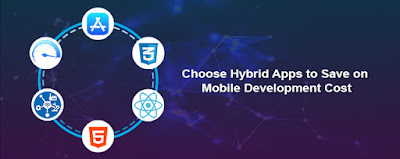Mobile Apps have fairly ousted the website culture and the numbers speak for themselves.
- In 2016, we had more than 149.3 billion app downloads worldwide.
- As of March 2017, Google Play Store has more than 2 billion applications, and
- Worldwide, we have more than 2 billion smartphone users worldwide.
Subsequently, more and more mobile app development companies are finding new ways to improve the mobile app scenario. And the good news is, there have been some significant advancements in the field like Instant Apps, Voice Assistants, IoT, Hybrid Apps and more.

In this blog, we will mainly talk about Hybrid Apps and how they are toppling Native Apps.
What are Hybrid Apps
A Hybrid App can described as a traditional web app fixed in the frame of a native app. It is a fusion of native mobile app development and web development as it involves a base code that can be used on all platforms. The base code is generally designed with the help of HTML, CSS and JavaScript, and determines the functionality and interface of the app.
Each Hybrid App uses Android System WebView, which is an application designed by Google LLC that provides an interactive frame to the Hybrid App and also partially allows the app to use hardware and applications of the phone. The core function of this ‘Android System WebView’ application is to enable the Hybrid App to use phone’s default browser (often Chrome) in order to become user-accessible.

In the past few years, people have realized the limitations of Native Apps such as ever-expanding size, falling speed etc. Even from the developer’s point of view, cost of development, cost of maintenance etc., are discouraging businesses to create native mobile apps. This realization brought us to a better, more feasible option – Hybrid Apps.
Here are some of the major reasons why a large number of users and developers prefer Hybrid Apps over Native Apps:
Ease of building
It is quite obvious that program coding is less complicated in comparison with web coding. To build a Hybrid App, a skilled web developer would need only Apache Cordova (PhoneGap) Framework to code the app much faster than a native app. Also, a range of plug-ins provided by the JavaScript that can be used by developers to introduce unique features in the app. In a nutshell, building a Hybrid App is easier compared to Native App.
Cross-platform compatibility
Since Hybrid App comprise of a base code that is compatible with browsers, irrespective of the OS platform; Hybrid App are popular among developers simply because unlike Native apps, Hybrid Apps need not be tested against different phone models and platform. The only major compatibility-test required for Hybrid Apps is that with the WebView.
User Experience
Developers understand the importance of user experience and this is also one of the major factors why they route for Hybrid Apps.
Because the one and only interface in case of Hybrid Apps is the phone browser; users who prefer uniformity in design do like to use Hybrid Apps. However, in this case, people are still not used to the simplicity of Hybrid Apps, especially when Native Apps offer exclusive interface for each apps.
So why would people migrate to Hybrid Apps then? Check out the next pointer to find out.
Storage
Hybrid Apps are there when you need them. They live in your browser and leave as soon as you swipe them away; they do collect a small of data though. Native Apps on the other hand, keep devouring on your phone’s internal storage until there is none left. Unfortunately, android fills up quite fast, and fortunately Hybrid Apps have largely solved this problem.
No Updates needed
Native Apps need to be updated from time to time, or you may miss out on certain features. Well and good. But what buggers off most users is having to update the app for minor security updates or primitive feature they can hardly notice. This is not the case when it comes to Hybrid Apps, until the update released is a major one.
In conclusion, Hybrid Apps are expected to take over the mobile app development companies India market in coming years. However, another a huge faction of users still prefer the native app interface because it is more customized and feature-rich in comparison to Hybrid Apps. So, it would be fair to say the future of Hybrid Apps is largely in hands of what 2018 has in store for them.
0 Comment(s)